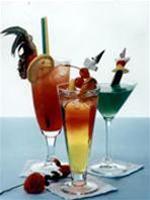The world is increasingly producing various types of beverages, offering us hundreds of choices. But which options are friendly to our health?
Two-thirds of our body is made up of fluids, with water being the primary component. Therefore, water plays a crucial role in providing the body with essential minerals such as Calcium and Magnesium.
-
Helps the body absorb necessary nutrients and digest food easily.
-
Transports nutrients in the blood throughout the body.
-
Lubricates membranes and joints.
-
Aids the body in eliminating waste.
-
Regulates body temperature through sweating.
Adults need to drink 6-8 large glasses of water each day.
Typically, we often hear recommendations about which drinks to consume or avoid, such as which beverages are good for health and which are harmful. However, few people understand the specific benefits and drawbacks.
Let’s take a look:
1- Tea:
 |
|
(Photo: Youth) |
Tea is a nutritious beverage because it contains tannin, caffeine, essential oils, vitamins, proteins, and minerals.
Effects: The main component of tea is tannin, which gives it astringent flavor and is beneficial for digestion. Drinking tea stimulates the central nervous system, cardiovascular system, kidneys, and digestive tract.
It is advisable not to drink strong tea before bedtime as it may cause insomnia. Green tea is the best option.
2- Coffee:
Coffee contains caffeine, proteins, fats, and minerals…
Effects: It stimulates the central nervous system and cardiovascular system. People with high blood pressure or heart conditions should avoid coffee.
Similar to tea, coffee should not be consumed before bedtime as it may lead to difficulty sleeping.
3- Alcohol and Beer:
The alcohol content in beer ranges from 3-6%, in rice wine it is 5%, while white wine and colored spirits can have alcohol content up to 39%.
Effects: For these drinks, the negative effects generally outweigh the benefits. The main advantage is that they may stimulate digestion and create a pleasant sensation (if consumed moderately).
Regular consumption of alcohol can harm the liver, kidneys, stomach, and many other organs. Alcoholics have weakened resistance to infections, exacerbate illnesses, impair memory and work capacity, and adversely affect the intellect of future generations.
4- Mineral Water:
Natural mineral water is sourced from deep underground springs, and it is a saline solution rich in minerals. Some natural mineral waters are radioactive and are often used for therapeutic purposes and hydration.
Artificial mineral water is produced by saturating drinking water with CO2 gas and some mineral salts.
5- Fresh Fruit Juice:
 |
|
(Photo: Youth) |
Fresh fruit juice is made from fresh fruits mixed with water and sugar, such as orange juice, lemon juice, and watermelon juice.
Effects: It has positive effects on health as it is rich in vitamins and minerals. It is advisable to drink plenty of fresh fruit juices, especially in the summer.
6- Fruit Juices and Soft Drinks:
These drinks are produced from fruit essential oils, food colorings, and CO2 dissolved in water.
Effects: They are refreshing and provide a pleasant taste, encouraging increased consumption.
Note: Do not consume carbonated drinks when experiencing diarrhea. It is also advisable not to let children consume excessive amounts of carbonated drinks, as the sugars can raise blood sugar levels and inhibit gastric secretion, leading to loss of appetite.

















































